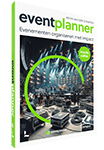Somewhere along the way, we stopped thinking for ourselves and became too focused on following trends. That’s not necessarily a bad thing, considering the staggering speed of change that defines our industry. But it also means we’re running the risk of falling prey to clichés and not being truly authentic or creative.
What is a cliché? Usually, clichés refer to practices, ideas, or elements that are overused to the point of losing their impact and becoming boring or even irritating.
A classic example of a cliché in the event industry is to play “chill” and “relaxing” music before knowledge sessions. Spa music isn’t appropriate for a serious event, yet many of us do it anyway.
Although these event clichés seem like innocent elements that accompany the attendee experience over and over again, they will make your attendees feel as part of the movie Groundhog Day. This “by-default” thinking results in using clichés will prevent you from being truly creative and focus on generating value for your guests.
You’ll be trapped into doing the same things the same way for every single event, believing this is the right thing to do, and reducing the impact you want to have on your attendees. To keep this from happening, we’ve come up with this list of planning clichés and how you can avoid them:
Cliché #1. It’s all about “authentic” experiences
Whenever you’re planning an event, you must have the attendees’ best interests in mind. There’s no doubt about that. However, some of us might go to unnecessary lengths to design experimental (and weird) guest experiences.
And although the intention behind these actions is noble (to impress and delight your attendees), most of the time, the results can be beyond annoying.
Let’s take, for example, the use of expensive technology. Some “hot” events have incorporated virtual reality goggles as part of the networking experience. Instead of having face-to-face interactions with other attendees, people wear virtual reality devices to communicate with the same people, just in a “different environment.”
Though definitely a cool concept, this action doesn’t bring any added value to the conversation, and instead of providing a safe and noise-free environment to potentiate the communication between the attendees, it only added even more distractions.
That’s why whenever you have a brilliant idea on how to make your event more interesting or “cool,” stop and ask yourself if your idea will actually enrich your guests’ experience or just end up being a silly move that will complicate their experience.
Cliché #2. Personalising the event program
Giving your attendees the option to personalise some of their experience is a good thing. However, when taken to an extreme, it might overwhelm your audience.
Think about the customization of the event program. There’s nothing wrong with having attendees choose between two or three different workshops, but things can get ugly when your guests have to create their own schedule and decide between dozens of sessions that are running simultaneously.
First, it’ll create the feeling of missing out. By choosing to go to one session, attendees have to give up five similarly interesting dynamics. Second, they won’t be able to focus, because in most cases, your attendees will try to attend all the sessions they like at the same time, stopping at each one for five to ten minutes each, and then going to the next one
Finally, by attending too many sessions and listening to several speakers, your attendees might find it hard to retain critical information. They’ll be burned out from insight overload, and it’ll be more difficult for them to focus.
So instead of overwhelming them with too many options and an overly enriched program, downsize the content volume and offer a few high-quality sessions with less personalization options.
Cliché #3. You must always engage the audience at all times
Some of the event professionals transformed the attendee engagement into their life mission. Live polls, quick games, moderated interactions during a session, and ice-breaker exercises are all meant to make attendees enjoy and better connect with the event; however, most of these dynamics may be seen as intrusive and actually disrupt the attendee experience.
Obviously, a certain degree of engagement is necessary.
But you can’t ask your attendees to spend half of their session time interacting with the people sitting next to them instead of paying attention to the speakers they came to hear.
Cliché #4. Ice-breaking games will boost the networking
One of the reasons why people attend events is to interact with others face-to-face and generate valuable business relationships.
The unfortunate think is that instead of setting up powerful networking sessions, such as B2B matchmaking, you’d be spending time on coming up with silly ice-breaking games that will make people feel awkward.
Do not fall into this trap, and instead focus on important things, such as building special registration forms to find out your attendees’ networking preferences and matching the offer and demand by setting up short one-on-one meetings where your attendees will be able to communicate in a safe and pre-determined format.
Cliché #5. You must promote your event on social media
Facebook, Instagram, Twitter, Pinterest … these can transform your day into a living hell. Pouring financial resources into sponsored ads on social media is not the answer.
Algorithm changes that lack transparency and the strict ad rules you must obey when setting up something on social media can work in some cases, yet there are other ways in which you can market your event.
For example, invest in your brand’s website and blog, create valuable content, connect with your audiences and with industry influencers, provide actionable insights, and be always present. Then, when you have an event, you can count on others to talk about you.
Final thoughts
Doing things your own way is not a bad thing. On the contrary, it sparks the necessary creativity to plan an authentic event and avoid the unnecessary clichés. So instead of copying others, thinking they know best, try to be innovative and follow your common sense.









